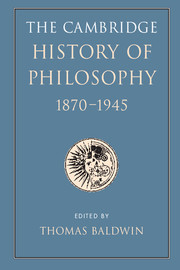Book contents
- Frontmatter
- Contents
- List of contributors
- Introduction
- I 1870–1914
- II 1914–1945
- 8 Logic and philosophy: the analytic programme
- 9 The diversity of philosophy
- 32 The continuing idealist tradition
- 33 Transformations in speculative philosophy
- 34 Realism, naturalism, and pragmatism
- 35 French Catholic philosophy
- 36 Spanish philosophy
- 37 The phenomenological movement
- 38 Heidegger
- 39 Latin american philosophy
- 40 Japanese philosophy
- 10 Knowledge, language, and the end of metaphysics
- 11 Philosophy and the exact sciences
- 12 Mind and its place in nature
- 13 Philosophy and social science
- 14 Ethics, religion, and the arts
- 15 Law and politics
- Biobibliographical appendix
- Bibliography
- INDEX
- References
38 - Heidegger
from 9 - The diversity of philosophy
Published online by Cambridge University Press: 28 March 2008
- Frontmatter
- Contents
- List of contributors
- Introduction
- I 1870–1914
- II 1914–1945
- 8 Logic and philosophy: the analytic programme
- 9 The diversity of philosophy
- 32 The continuing idealist tradition
- 33 Transformations in speculative philosophy
- 34 Realism, naturalism, and pragmatism
- 35 French Catholic philosophy
- 36 Spanish philosophy
- 37 The phenomenological movement
- 38 Heidegger
- 39 Latin american philosophy
- 40 Japanese philosophy
- 10 Knowledge, language, and the end of metaphysics
- 11 Philosophy and the exact sciences
- 12 Mind and its place in nature
- 13 Philosophy and social science
- 14 Ethics, religion, and the arts
- 15 Law and politics
- Biobibliographical appendix
- Bibliography
- INDEX
- References
Summary
The German philosopher Martin Heidegger (1889–1976) is by a wide margin the single most influential philosopher of the twentieth century. His original motivation for doing philosophy arose out of religious concerns (he was raised as a Roman Catholic and studied for the priesthood, before converting to a radical form of Lutheranism just after the First World War), and one of the easiest ways to try to make sense of much of his philosophy is to trace in it the shadow of various traditional religious beliefs and doctrines. Thus philosophically in parallel to Heidegger’s own conversion from Catholicism to Protestantism, his early interest in scholastic metaphysics was increasingly placed in the service of a project that had its origins in a certain radical Protestant tradition of ‘negative theology’. The negative theologian holds that God is so different from anything else, so ‘transcendent’, that it is utterly impossible to grasp him in conceptual terms; he is accessible only through faith. Since human reason cannot know him, any form of theology (of rational, conceptually articulated doctrine) can be no more than a perverting distortion of the vital reality of religious belief. The only task left for philosophy in this construction is to destroy theology totally, to undermine from within the pretensions of human reason. Heidegger’s philosophy, like the National Socialism he espoused in the 1930s, was intended to initiate a conservative revolution, which would consign the whole of traditional philosophy, especially Neo-Kantianism, to the rubbish-bin, and also in some not easily definable way transform human life. His religious commitments after the National Socialist period seem to have remained strong until the very end of his life, although they became difficult to categorise in any conventional terms. Thus in an interview given in old age and published by his own request only after his death, he famously remarked that the modern world was so debased that ‘only a God could save us’.
- Type
- Chapter
- Information
- The Cambridge History of Philosophy 1870–1945 , pp. 497 - 506Publisher: Cambridge University PressPrint publication year: 2003



